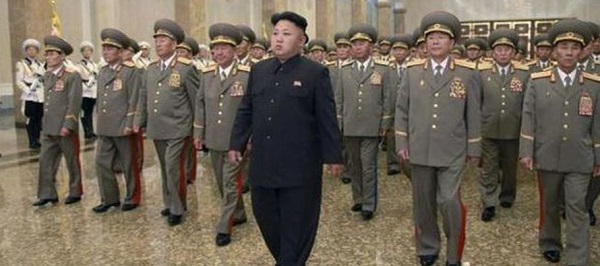
Seoul, South Korea | AFP |
North Korea has conducted a fifth nuclear test, its most powerful to date, South Korea’s President Park Geun-Hye said Friday, condemning the move as an act of “self-destruction” that would deepen its isolation.
The test will send tensions soaring over the North’s nuclear and ballistic missile ambitions, which have already earned international condemnation and United Nations sanctions.
Park spoke out against the “manic recklessness” of the North’s young ruler Kim Jong-Un, who has exulted in a series of ballistic missile launches and the last nuclear test in January.
“Kim Jong-Un’s regime will only earn more sanctions and isolation… and such provocation will further accelerate its path to self-destruction,” she said, warning his obsession with creating a nuclear arsenal posed a grave challenge.
“We will step up pressure on the North by using all possible measures, including more, stronger sanctions on the North with the international community and at the UN Security Council,” she said.
Seismic monitors detected a 5.3-magnitude “artificial earthquake” near the North’s Punggye-ri nuclear test site, with “almost identical patterns” to previous detonations, according to South Korean experts.
“We believe that it was a nuclear test. We are trying to figure out whether it was successful. The blast measured about 10 kilotons,” a defence ministry spokesman in Seoul told reporters.
The North’s third nuclear test, staged in February 2013, was previously considered the most powerful to date, with a yield of six to nine kilotons.
“The 10-kiloton blast was nearly twice the fourth nuclear test and slightly less than the Hiroshima bombing, which was measured about 15 kilotons,” said Kim Nam-Wook from the South’s meteorological agency said.
Japan’s public broadcaster NHK reported the country’s defence ministry was preparing to dispatch aircraft to analyse air samples to see if any radiation could be detected.
“If North Korea conducted a nuclear test, that can never be tolerated. We must lodge a strong protest,” said Japanese Prime Minister Shinzo Abe.
The US National Security Council said it was aware of seismic activity in the region of the test site and was “monitoring and continuing to assess the situation in close coordination with our regional partners.”
‘Caught off guard’
North Korea has been hit by five sets of United Nations sanctions since it first tested a nuclear device in 2006. Since the January test concern has also grown over a series of provocative ballistic missile launches.
Pyongyang test-fired three missiles on Monday as world powers gathered for a G20 meeting in China, with Kim Jong-Un hailing the tests as “perfect”, and US President Barack Obama warning it would only up the pressure.
North Korea has always insisted it will continue nuclear tests despite global condemnation and toughened sanctions. Experts say they are likely aimed at refining warhead design and reliability as well as increasing yield.
Outside monitors will now attempt to analyse the yield to try to determine what kind of a breakthrough it represents, particularly whether it is a standard atomic bomb or a more powerful hydrogen, or thermonuclear bomb.
North Korean nuclear tests are usually heralded by chatter among analysts about preparations at Punggye-ri but there had been little discussion in recent weeks over any signs.
“The test caught many off guard, although Seoul officials have for months maintained that the North was maintaining a condition in which it was ready to stage a nuclear test any time,” said Kim Jin-Moo, an analyst at the Korea Institute for Defense Analyses.
China pushed to act
Kim said the recent series of missile tests, including one launched from a submarine that far exceeded the range of previous such exercises, was a precursor to this “show of force” planned for months and timed to coincide with its founding day anniversary.
“Also, the test was staged right after the G20 summit was held in its neighbour China. I think it was also aimed at maximising shock to the international community,” he said.
The test is another slap in the face to the North’s chief ally China which has been under pressure to rein in its behaviour, and diminishes any chance of a resumption of six-country talks on North Korea’s nuclear programme.
“I believe China will be driven into the most difficult position” as the international community expects Beijing to act to ease tensions, said Shunji Hiraiwa, professor at Kwansei Gakuin University and an expert on the Korean peninsula.
North Korea claimed its January test was of a miniaturised hydrogen bomb, which can be far more powerful than other nuclear devices.
But scientists say the estimated yield of around six kilotons was similar to the North’s previous nuclear test in 2013, and far too low for a thermonuclear device.
However, at a rare ruling party congress in Pyongyang in May, Kim Jong-Un hailed what he called a “historic” landmark, and insisted it had been a hydrogen blast.
He praised the country’s scientists for “creating milestone miracles with the magnificent and exhilarating sound of the first H-bomb of our republic”.
 The Independent Uganda: You get the Truth we Pay the Price
The Independent Uganda: You get the Truth we Pay the Price



